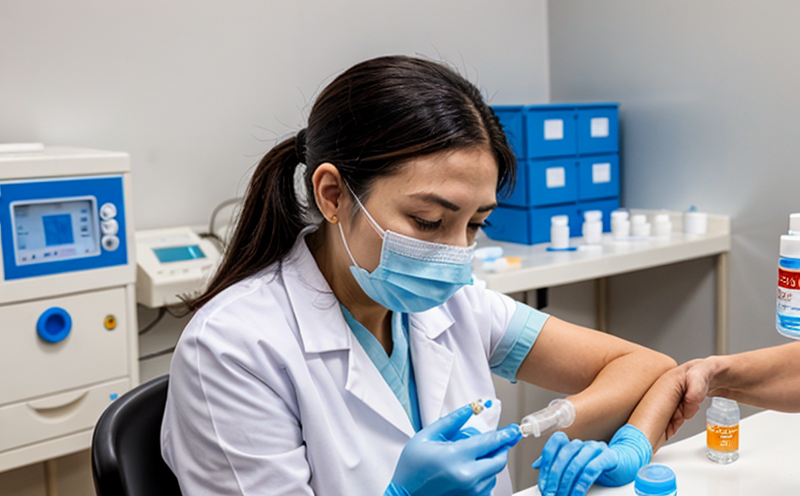Glycan Mapping of Conjugated Vaccines Testing
The glycosylation profile of a conjugate vaccine is critical to its efficacy and safety. Glycan mapping, the process of characterizing the sugar moieties attached to proteins or lipids in biopharmaceuticals such as vaccines, plays a pivotal role in ensuring that these products meet stringent regulatory standards. In this service, we employ advanced analytical techniques to map glycans on conjugated vaccines, providing our clients with comprehensive data that can be used for quality assurance and product development.
Conjugate vaccines are composed of a pathogen-derived antigen linked to a carrier protein or carbohydrate via a chemical linker. The glycosylation pattern of the conjugate is essential as it can influence immune responses, stability, and toxicity. Glycan mapping allows us to identify potential variations in manufacturing processes that could affect product consistency.
Our team uses state-of-the-art mass spectrometry (MS) techniques such as high-performance liquid chromatography tandem mass spectrometry (HPLC-MS/MS), which enables the precise quantification of glycan structures. Additionally, we utilize capillary electrophoresis time-of-flight mass spectrometry (CE-TOF MS) for comprehensive analysis. These methods provide detailed information about the type and distribution of glycans present in the conjugate.
The glycosylation profile can vary due to differences in manufacturing processes or batch-to-batch variability, which is why it's crucial to standardize these profiles across all batches produced by a manufacturer. Glycan mapping helps ensure that each batch meets the required specifications set forth by regulatory bodies like the World Health Organization (WHO), European Medicines Agency (EMA), and US Food and Drug Administration (FDA).
By understanding how glycosylation impacts the overall structure and function of the vaccine, researchers can optimize production methods to enhance safety and effectiveness. This service is particularly important for new vaccines where there may be limited historical data on expected glycan profiles.
In addition to characterizing individual batches, we also conduct comparative studies between different lots produced by various manufacturers or at different stages of development. Such comparisons help identify any inconsistencies that might arise during manufacturing or formulation changes and allow for timely adjustments if necessary.
Our expertise lies not only in executing these complex analyses but also in interpreting the results accurately so that our clients can leverage this information effectively within their organizations' workflows. With detailed reports tailored to meet specific client needs, we ensure transparency throughout every step of the process, from sample preparation through final analysis and reporting.
Benefits
- Enhanced Product Quality: By providing precise information about the glycan composition, we support our clients in ensuring high-quality products that meet regulatory requirements.
- Informed Decision Making: Data from glycan mapping can guide decisions regarding process improvements and formulation adjustments aimed at enhancing vaccine performance.
- Regulatory Compliance: Our rigorous approach ensures that all testing aligns with international standards, supporting compliance efforts for global markets.
- Risk Mitigation: Early detection of potential issues related to glycosylation can prevent costly delays and recalls downstream in the product lifecycle.
Eurolab Advantages
Eurolab is committed to delivering unparalleled service excellence in vaccine testing. Our team of highly qualified scientists brings extensive experience in pharmaceutical research and development, ensuring accurate and reliable results every time.
We pride ourselves on maintaining ISO/IEC 17025 accreditation, which guarantees that our laboratory adheres to the highest quality standards. This accreditation reflects our dedication to delivering accurate data through robust validation procedures and continuous improvement practices.
Our advanced instrumentation allows us to perform comprehensive analyses even when dealing with challenging samples or complex mixtures. We stay abreast of emerging trends in glycan mapping technology, allowing us to offer cutting-edge solutions that address evolving industry needs.
International Acceptance and Recognition
Glycan mapping is recognized as an essential component of vaccine development and production by numerous regulatory authorities worldwide. The WHO, EMA, FDA, and other bodies have established guidelines for the analysis of glycosylation in biologics.
Our methodology aligns closely with these standards, ensuring that our findings are widely accepted across different regions. This global acceptance facilitates smoother interactions between manufacturers, regulatory agencies, and healthcare providers, fostering confidence in the reliability of our test results.
The robust nature of our approach ensures compatibility with international guidelines such as ICH Q6A for quality aspects of biotechnology products and ISO standards related to laboratory operations. By adhering strictly to these benchmarks, we contribute towards maintaining the integrity of the pharmaceutical supply chain globally.





